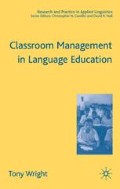Abstract
In simple terms a learning context occurs when a person encounters a learning opportunity in the course of everyday life. This definition does not assume success in learning, merely that there is an opportunity that may or may not be acted upon. When a person makes a commitment to learn, the opportunity becomes a goal. The analysis of any learning context must first, therefore, account for the relationships between learners and learning opportunities. However, as we have seen in Chapter 1, teachers are major players in classrooms learning contexts, and the full picture will also include teachers’ contributions. The relationships between learners, teachers and learning opportunities together constitute the basis of classroom management practices.
Access this chapter
Tax calculation will be finalised at checkout
Purchases are for personal use only
Preview
Unable to display preview. Download preview PDF.
Further reading
Askew and Carnell (1998) argue for ‘transformational learning’.
Bransford et al. (2000) is a useful introduction to various issues in learning.
Claxton (1999) contains a wide-ranging model of human learning in the context of ‘lifelong learning’.
Drew and Heritage (1992) is a ‘technical’ collection of papers on institutional talk.
Hargreaves (1994) is an account of teachers’ responses to change in their working practices.
Kohonen (2001) makes the case for ‘experiential learning’ in language education.
Lantolf (2000) is a good introduction to activity theory in second language learning.
Lave and Wenger (1991) is a useful study and conceptualisation of apprenticeship models of learning.
Wells and Claxton (2002) is a collection which makes the case for more informal language learning.
Wenger (1998) is a theorised account of learning in ‘real world’ contexts, with important implications for education.
Copyright information
© 2005 Tony Wright
About this chapter
Cite this chapter
Wright, T. (2005). Classrooms as Formal Contexts for Learning. In: Classroom Management in Language Education. Research and Practice in Applied Linguistics. Palgrave Macmillan, London. https://doi.org/10.1057/9780230514188_3
Download citation
DOI: https://doi.org/10.1057/9780230514188_3
Publisher Name: Palgrave Macmillan, London
Print ISBN: 978-1-4039-4089-6
Online ISBN: 978-0-230-51418-8
eBook Packages: Palgrave Language & Linguistics CollectionEducation (R0)

